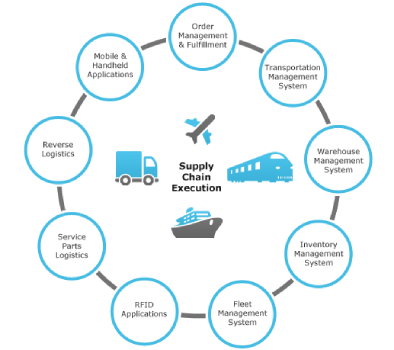Logistics Billing Software
Logistics management is vital for any manufacturing business. Logistics involves the flow of all materials from the source of origin to the final destination. This includes the selection of suppliers, vendors, transportation routes and delivery methods. Logistics management is very vital for the overall success of any organization.
Nowadays companies are harnessing the power of technological tools such as logistics management system to streamline all supply chain activities. Logistic ERP software simplifies complex operations and brings about integration between all departments of a production firm. It handles huge amounts of important data that can enhance visibility across the organization.
In recent times, logistics software solutions have become wider in scope and functionality. They consist of a number of specialized modules that help in material planning, fleet management, inventory control, quality checks, and order processing.
Logistics management solutions can infuse a high level of accuracy in routine processes. In fact, manufacturing and production firms across the globe have now adopted logistics tracking software to increase efficiency and synchronization in work processes.

What are the features of logistics software?
- Inventory Management: One of the most essential features for logistics software solutions is comprehensive inventory management. It ensures that organizations have adequate raw materials, components, and finished goods at all times. Logistics management solutions make sure that there is no halt or delay in production due to the shortage of materials. Logistics tracking software makes use of real-time information so that there is a seamless flow of goods at all times.
- Warehouse Management: Logistics management software helps organizations manage their warehouses so that goods can be stored in a safe condition. It displays the available space and location of the warehouses so that there are no delays in stock management. Logistics management solutions facilitate smooth picking, packing, and shipping of goods so that all transactions occur without any obstacles.
- Forecasting: Logistics ERP software needs to have the ability to forecast well for effective operational efficiency. Logistics management systems bridge the huge gap between demand and supply to prevent wastage of resources. It makes use of historical data to enhance proper scheduling of production and inventory management. Logistics ERP software is a potent asset for managers as it can help them in planning for the future so that strategic objectives are achieved.
- Purchase Order Processing: Logistics software solutions automate all transactions related to purchase order management. It greatly reduces the time, money and effort needed to generate purchase orders. Logistics tracking software has a centralized order and billing management systems. This keeps purchase orders handling a top priority and increases accuracy in all processes.
- E-Commerce Integration: The future of logistics lies in e-commerce management. Logistics software platforms have all the required tools for successful e-commerce integration. This ensures that all the data from logistics management systems can be synchronized with e-commerce retail and CRM solutions seamlessly, thereby boosting efficiency.











